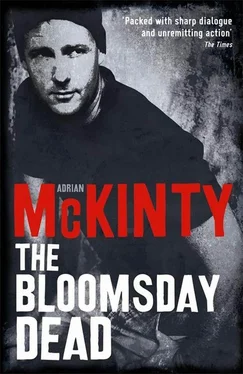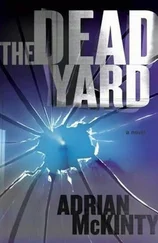Adrian McKinty - The Bloomsday Dead
Здесь есть возможность читать онлайн «Adrian McKinty - The Bloomsday Dead» весь текст электронной книги совершенно бесплатно (целиком полную версию без сокращений). В некоторых случаях можно слушать аудио, скачать через торрент в формате fb2 и присутствует краткое содержание. Жанр: Триллер, на английском языке. Описание произведения, (предисловие) а так же отзывы посетителей доступны на портале библиотеки ЛибКат.
- Название:The Bloomsday Dead
- Автор:
- Жанр:
- Год:неизвестен
- ISBN:нет данных
- Рейтинг книги:3 / 5. Голосов: 1
-
Избранное:Добавить в избранное
- Отзывы:
-
Ваша оценка:
- 60
- 1
- 2
- 3
- 4
- 5
The Bloomsday Dead: краткое содержание, описание и аннотация
Предлагаем к чтению аннотацию, описание, краткое содержание или предисловие (зависит от того, что написал сам автор книги «The Bloomsday Dead»). Если вы не нашли необходимую информацию о книге — напишите в комментариях, мы постараемся отыскать её.
The Bloomsday Dead — читать онлайн бесплатно полную книгу (весь текст) целиком
Ниже представлен текст книги, разбитый по страницам. Система сохранения места последней прочитанной страницы, позволяет с удобством читать онлайн бесплатно книгу «The Bloomsday Dead», без необходимости каждый раз заново искать на чём Вы остановились. Поставьте закладку, и сможете в любой момент перейти на страницу, на которой закончили чтение.
Интервал:
Закладка:
Bridget shook her head.
“Michael, I don’t know anything about that. I sent those men to kill you in Lima but by the time the op was on, Siobhan had gone missing, my men had found nothing, and the police were clueless. I thought you might be able to help where they couldn’t. I called the assassins off. I don’t know who tried to hit you in Dublin, but it was nothing to do with me. I promise.”
I didn’t need to reflect on it for a while. I believed her.
“Ok,” I said. “I’ll do my best. I’ll do more than my best. I’ll bring your daughter back,” I said.
Bridget wrote something on a piece of paper. She handed it to me.
She touched the side of my palm. Her fingertips were cold. I shuddered involuntarily. I smelled her hair and the sweat on her body. I felt her breath.
“Two phone numbers,” she said.
I looked at the note.
“The top one is my cell, the bottom one is Moran’s.”
“Ok, I’ll call in periodically,” I said.
I put the note in my jacket pocket.
“What are you going to do now?” I asked.
“I’m going to raise ten million dollars and I’m going to go to the police station and wait for them to call.”
“So you don’t think that was a crank note?”
“I don’t know, Michael, but what else can I do?”
“Aye.”
“What are you going to do now?” she asked.
“I’m going to take this photograph and go down to the Malt Shop and ask some questions.”
She leaned heavily on the table. She looked, for a moment, like she was going to fall forward into my arms.
“Thank you,” she muttered softly.
“Thank you, Bridget,” I said stupidly.
I stood and looked out the window.
“Ok, there’s the bat signal, I have to go,” I said.
She grinned weakly and turned to me. Our eyes locked longer than was strictly necessary.
“Good luck, Michael.”
She didn’t offer me her hand. I didn’t offer mine. We continued to stare at each other. But then she nodded. The interview was done. I turned on my heel and walked out of the room.
Moran and a couple of heavies were waiting outside the door. Moran stopped me.
“Are you filled in?” he asked.
“I am.”
“I hope you can help, Michael, I mean that sincerely. Siobhan’s the priority.”
I nodded.
“But remember what we talked about,” he said quietly.
I didn’t reply. I walked quickly through the length of the suite, turned into the corridor, and pressed the button for the ground floor. I was glad to be getting away from these people.
“Goodbye, Mr. Forsythe. Have a great day,” Sebastian said.
“I have other plans,” I said and walked out of the hotel.
6: THE RAT’S NEST (BELFAST-JUNE 16, 2:15 P. M.)
I exited the Europa Hotel, ran across Great Victoria Street, and juked into the Crown Bar. It was packed full of civil servants finishing their lunchtime pints, desperately trying to think of a reason for not going back to work. In the 1980s they might have called in a bomb scare, but you couldn’t have gotten away with that in Belfast nowadays.
I went to the bog, locked the cubicle door, retrieved my.38 and the bag of shells.
I checked the gun. Dry as bone. I’d have to write Ziploc a letter and let them know how useful their product was at keeping water away from firearms. I loaded the weapon and shoved it my pocket.
When I came out of the toilet, I saw one of Bridget’s goons sitting casually at the bar, smoking a cigarette.
Moran had obviously put a tail on me so I would be easier to find and kill when the midnight deadline came and went.
He would be the first order of business. I pulled the fire alarm next to the toilet and in the ensuing chaos sat next to him at the bar.
“I want to talk to you. Come with me to the snug,” I said.
He was a young guy, early twenties, easily intimidated.
“Listen, I don’t want to cause any-”
“The snug, over here.”
We walked over to one of the large enclosed booths while the barman assured everyone that the alarm had gone off by accident and told the customers to resume their seats. But still, it was pretty noisy and in a sec it wouldn’t be, so as soon I closed the snug door, I grabbed an empty Guinness bottle from the table and smashed it over the tail’s head. He slumped over and I laid him on the floor. With some care I removed the glass from his scalp and put him in the recovery position. He’d be right as rain in half an hour. I searched him for guns but all he had was a flick knife-what the hell was he going to do with that? I opened the snug door, walked quickly through the bar, slipped out the side entrance, turned right on Great Victoria, and headed south toward Bradbury Place and the Malt Shop.
The streets were packed. Shoppers, walkers, students, skateboarders, and a new phenomenon, Eastern Europeans begging with wooden bowls and makeshift signs that said “Please Help.” I gave them a few quid and hurried on. The first edition of the Belfast Telegraph had just been printed and about every fifty feet a newsboy was standing on a bunch of papers yelling “Telleyo, telleyo.”
The headline was “Hospital Cash Crisis.” I scanned the paper, nothing about Bridget or Siobhan, and I wondered if the peelers had asked for a news blackout. By the time of the third edition, some of the havoc I had wrought would be the lead story and cover photograph. But that was in a couple of hours. Not quite yet.
I binned the paper and started looking for the Malt Shop.
I was pretty familiar with this district, but there were new buildings up, old buildings gone. Nice restaurants, fancy cars. And despite my predictions, a plague of Starbucks. The big change was how differently people dressed from when I’d last been here in 1992. Back then half the men would have been in jackets and ties, the rest would have worn button shirts, and all the old-timers wouldn’t have been caught dead outside in anything less than a three-piece tweed suit and flat cap. Now everyone was dressed in casual wear: bright floppy T-shirts, shorts, sandals, cargo pants and the number of football shirts was staggering. Manchester United, Glasgow Rangers, and Glasgow Celtic being the most common. The women, too, were dressed down in baggy jeans and T-shirts and a lot of them were wearing Real Madrid football shirts, which at first I thought was some kind of solidarity thing with the bombing back in March but then I noticed that the shirts all had David Beckham’s number.
The final status symbol worn by a good chunk of the under-thirty population was a New York Yankees baseball cap. Cheap airfares, weak dollar, any mug could go to New York these days.
Still, it wasn’t all bad.
Two o’clock is quitting time for a lot of schools. And I’d like to find the man who isn’t moved by hordes of beautiful seventeen- and eighteen-year-old sixth-formers striding toward the train station in short skirts, patent leather shoes, white shirts, and ties.
I couldn’t go farther down the street because the cops had blocked off the road for a march and “historical pageant” by a small group of Independent Apprentice Boys who were reenacting a scene from the siege of Derry. The IAB were in full regalia, sweating in the humidity. Dark suits, black ties, black bowler hats, and orange-colored sashes. The scene was the famous one where the Protestant apprentice boys locked the gates of Derry to stop the Catholic armies from capturing the city-an actual historical event that had happened over three hundred years ago. I had never heard of the reenactment being performed in Belfast before. They’d probably gotten a cultural grant from the European Community. The “Boys” were actually forty- and fifty-year-old men with beer guts, bad mustaches, and hair so unkempt Vidal Sassoon would have broken down and wept. They were all obviously the worse for drink. The Catholic army this afternoon was an intoxicated man in a green sweater with a pikestaff.
Читать дальшеИнтервал:
Закладка:
Похожие книги на «The Bloomsday Dead»
Представляем Вашему вниманию похожие книги на «The Bloomsday Dead» списком для выбора. Мы отобрали схожую по названию и смыслу литературу в надежде предоставить читателям больше вариантов отыскать новые, интересные, ещё непрочитанные произведения.
Обсуждение, отзывы о книге «The Bloomsday Dead» и просто собственные мнения читателей. Оставьте ваши комментарии, напишите, что Вы думаете о произведении, его смысле или главных героях. Укажите что конкретно понравилось, а что нет, и почему Вы так считаете.










